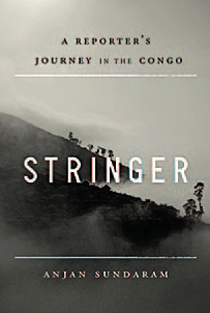Stringer: A Reporter’s Journey in the Congo
A book for those curious about what it takes to be a foreign correspondent
Share

Stringer: A Reporter’s Journey In the Congo
By Anjan Sundaram
Wonder what it takes to be a foreign correspondent? In the first scene of his book about launching a journalism career in the Congo, Anjan Sundaram answers the question without posing it. A street urchin steals Sundaram’s phone. Sundaram gives heedless chase into the night, through alleys and a field and into a garbage dump, where the thief divulges his first name (“Guy”) and disappears. The next night, Sundaram returns. Guy materializes, sans phone and sans remorse. Sundaram settles instead for a quick friendship, a shared joint and a night-long tour of Kinshasa on Guy’s motorcycle. Persistence, curiosity, and a fundamental openness to lived experience: This is what it takes, and Sundaram has it. His narrative instinct and hoovering senses make him yet another cut above.
Sundaram graduated from Yale University in 2005 as a math whiz with a job offer from Goldman Sachs. Instead, he chose to “immerse” himself in the world as a journalist and headed to the Democratic Republic of the Congo, then in the midst of conflicts claiming millions of lives. He wanted to live a complexity he could not find as a news reader. By the time he eventually left, he felt he had “approached [the Congolese], and possessed some part of their distress.”
The book offers glimpses into the Congo, but mostly, this is a story about a determined amateur making it as a reporter. Sundaram clambers onto the lowest journalistic rung, as a freelance “stringer.” We see him using sources, being used, making fast friends but enjoying only short friendships, always moving, an itinerant storyteller learning his trade. By the time post-election violence engulfs Kinshasa, Sundaram is reporting for the New York Times. All the other foreign correspondents fled; Sundaram was not shrewd enough to plan an escape from probable mobs. Good for him. Though perhaps the great irony is that Sundaram reached the peak of his influence as a reporter while confined to his room in a gated compound. He couldn’t see much of anything, but he listened to the radio and made calls. He was there—or rather, closer than the rest.
Andrew Stobo Sniderman
Visit the Maclean’s Bookmarked blog for news and reviews on all things literary.